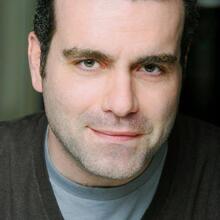Contrary to first impressions, Matt Rife is not Dane Cook 2.0. If you understand this reference, congratulations: You are old. Dane Cook was, at the beginning of this millennium, like Rife is today: a good looking, twentysomething, white-guy stand-up comedian, whose bread and butter was raunchy and misogynistic humor. Cook was, at one point, able to parlay his enormous stand-up success—which included selling out Madison Square Garden—into an ever so brief film career.
Rife is almost that. But when I say he is not the second coming of Cook, that is, in part because Rife’s level of success has yet to reach the levels that Cook achieved at his peak.
Where Rife has surpassed Cook is in focusing his stand-up less on the scripted, structured monologizing that has been part and parcel of the medium since at least vaudeville. Instead, Rife has focused on interactive crowd work. His best moments are in his extemporaneous back-and-forths with audience members, particularly those from traditionally marginalized groups, such as people with disabilities, members of the L.G.B.T.Q. community and the elderly.
In one set, when an elderly man tells him that he has been in a wheelchair for 13 years, Rife responds, “It’s nice to just relax, isn’t it?” then turns to the audience and says, “Optimism.” Rife gestures back to the man, says, “Optimism Prime” and goes on to make a series of robot noises and movements referencing the fictional hero, Optimus Prime from the “Transformers” franchise.
So successful has Rife been with crowd work that he created an entire 50-minute special title, “Walking Red Flag,” dedicated entirely to his interactions with audience members.
It is in these spontaneous moments of boyish mischievousness, particularly when he interacts with those who the mainstream media either ignores or handles with kid gloves, that Rife has found his comedic sweet spot. These impromptu interactions with audience members foreground his strength as a comedian: the one-off improvised wisecrack. It is here that he can, if he so chooses, establish his credibility and sustainability as a comic.
When Rife interacts with a young woman with cerebral palsy who tells him from the crowd that he is, “hot,” he responds with the entendre loaded. “You watch your hands now. Just because you’re in a wheelchair doesn’t mean I won’t beat your breaks off.” The sexual nature of the quip is par for the course for Rife’s humor—and par for the course for most contemporary white male stand-ups in their 20s. But it is his desire to reach out and engage with those who most frequently are ignored or avoided, especially in youth-driven milieus, that lift him above the typical young, white-guy schtick.
More importantly, he doesn’t treat them with any inordinate amount of reverence or caution but instead engages with them as they are: ordinary people at a comedy show looking to have a laugh. Rife’s work is grounded in an adolescent approach to women and sex, and none of his interlocutors are spared from his often raunchy takes on relationships. That is only a bad thing if you are not into that type of humor. But then you would not be at a Rife show in the first place if you weren’t.
What Rife’s work does is call out and dissipate the feelings of confusion and concern that many feel when interacting with people they’re not familiar engaging with, like people with disabilities or who have been in some way “othered” by society at large. Rife acts as a bull in a china shop, knocking over those feelings of hesitancy, fear and caution that frequently underlie our feelings when encountering those who are “different.”
Rife’s going out of his way to interact with the marginalized in his shows speaks to two correlative aspects of humor, both of which open up a space for the construction and the deepening of authentic relationships. One of those aspects is the knocking over of sacred cows, which in turn leads to another aspect, the deflation of tension.
This one-two comedic procedure proves liberating for the audience and allows for authentic engagement. In Rife’s case that authentic engagement is usually full of scatological and sexual humor, but that is beside the point. In his foregrounding of the marginalized, he has given them a public space to fully manifest their humanity. They are not being celebrated. They are not being degraded. They are being allowed to be who they are.
Rife has built his success as so many young artists do today, through the relatively grassroots world of social media. He has nearly 20 million followers on TikTok, and his first three stand-up specials, including “Walking Red Flag,” were self-produced and distributed on his YouTube channel.
Rife’s humor of the quick, off-the cuff variety is best suited to these more conversational modes of presentation. He is lucky that he has a gift for improvisation and interacting with crowds, because his straight up standup is pedestrian. It is relatively shallow and limited to the world of sex and dating. There is no great comedic vision coming from the mind of Rife. John Mulaney, he is not. The reviews of his first “grownup” standup outing, last year’s Netflix special, “Natural Selection,” were brutal.
Vox called it “painfully mediocre.” Vulture described the special as “entirely underwhelming.” These reviews were fueled in large part by the controversy surrounding Rife’s opening joke in the special, an offensive comment about spousal abuse. It points as much to Rife’s lack of imagination as it does to his insensitivity and privilege.
At 28, Rife has a long way to go in terms of developing himself as a comedian. However, as Tik-Tok and other platforms continue to fracture and transform the way we receive all media, comedy in particular, the question can be raised as to whether Rife’s short, quick interactive stand-up might be the new standard for stand-up going forward. Maybe the extended scripted monologue will become a thing of the past.








